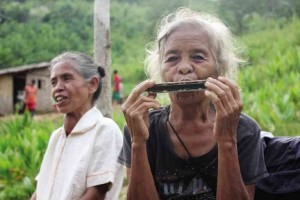From ‘Inang Tanda,’ Dumagat wisdom, stories and music

NATIVIDAD Bertudez or “Inang Tanda” plays her harmonica. Beside her is her eldest daughter Lorita in Barangay San Juan, Antipolo City. MARICAR P. CINCO
She stopped counting a long time ago and passed on to her grandchildren the task of keeping track of her age. According to them, she is 80, but they, too, are not sure how they came up with the number.
What’s certain is Natividad Bertudez is the oldest in the Dumagat tribal community in the southern portion of the Sierra Madre mountain range in Antipolo City.
The tribe refers to Bertudez as “Inang Tanda” (Old Mother) and seeks her advice on family and personal matters, although she is not exactly a chieftain. Its members have elected the president of the newly formed Tayabasang Umuusad Pangkatutubong Asosasyon Inc. or Tupai.
Inang Tanda is not only a well of wisdom and stories in the small community of some 40 Dumagat families in Purok Tayabasan. She plays a special role during gatherings in the neatly built bamboo hut where Tupai meetings are held or visitors, usually teachers and social workers, stay, between sunset and nightfall.
She would take out her harmonica and blow away music to which the young couples dance. With arm gestures, the performers sway and lower their hips, as if fetching water from a stream, to a repetitive tune that sounds like the Hispanic “Cariñosa” song.
Prized possession
There are no lyrics or a title to the number, Bertudez said, showing her set of teeth discolored from chewing on betel nut. But she plays that one piece she learned from her grandfather when she was a child.
She said she used to get invited to play the harmonica for the Americans in the next village of Calawis. “That was a very long time ago, back when I gave birth to Lorita,” she said in Filipino.
Lorita is the eldest among Bertudez’s seven children. She, too, does not know her age although her gray hair and wrinkled skin make her and Bertudez look like sisters.
Having to raise her family, especially after her husband, Ceding, died 20 years ago, Inang Tanda regained her penchant for music five years ago when she finally got her own instrument.
“A sponsor asked me what I wanted the most. I asked for a harmonica,” she said. A “sponsor” was probably a philanthropist, based on Bertudez’s recollection of the woman who once gave away gifts.
“She told me it was made in Taiwan and it cost P500,” Bertudez said of her prized possession.
‘Kasal-bundok’
The Dumagat have preserved some of their customs, such as the “kasal-bundok,” wherein marriages are prearranged by the parents of the bride and groom.
“We don’t have priests here. We just gather and feast on pork and that’s it,” Bertudez said.
As for burying the dead, “we don’t embalm the bodies. The person’s dead already. Why hurt him more?”
They also rely on nature to treat illnesses or animal bites, “except for severe cases or if there’s a chance to see a doctor downtown,” said Tupai president Rogelio Cruz.
In fact, a middle-aged woman named Delia dela Cruz, said there were certain plants for birth control. “It stops you from getting pregnant. That’s why I have only four children while others have nine,” she said.
Education, livelihood
Bertudez, like most adult Dumagat, knows only a little about reading and writing.
Although there are formal schools downtown, the children “eventually drop out because some parents wanted them to work in the forests instead,” said Ranito Gallego, a mobile teacher of the Department of Education who visits Tayabasan each week to teach.
It takes a two-hour hike and river crossing, or longer for nonresidents, to reach Tayabasan in the upland Sitio Ysiro in Barangay (village) San Jose. The area is part of the 28,000-hectare Marikina watershed, a river basin that the government proclaimed to be a protected area.
The indigenous community relies on slash-and-burn farming, charcoal-making and small-scale gold mining for a living that if unmanaged may cause serious environmental damage, according to Darwin Flores of the private sector-led Philippine Disaster Recovery Foundation.
“There has to be an established long-term working relationship with the community if we really want to see the impact of watershed management programs,” Flores said.














